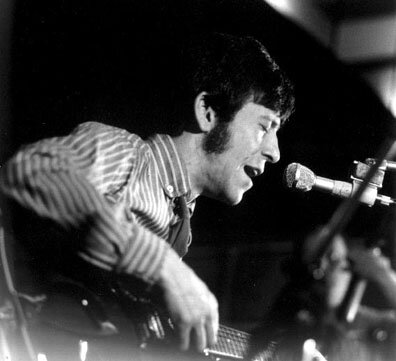ALEXIS KORNER. Ronnie Scott's Club.
`JARS` ISSUE 146, JAN - FEB 2004
ALEXIS KORNER

ALEXIS KORNER
( photo: David Redfern -
http://www.musicpictures.com/ )
It is easy to forget, at a time when many jazz festivals routinely - and increasingly uncontroversially - include everything from so-called `world music` to classical/jazz fusions, R&B and freely improvised jazz, that the coincident explosion of bebop and traditional jazz in the late 1940s created a bitter ideological divide among jazz listeners. Lines of battle between the `Mouldy Fygges` and modernists were drawn. The banjo was the obligatory talisman of the traditional bands, and from 1949, Alexis Korner played that instrument (along with piano, guitar and mandolin) with the skiffle groups of Chris Barber and arch-traditionalist Ken Colyer. Later, however, Korner was to be the catalyst of a new and vital movement in the history of British jazz - rhythm and blues - when traditionalists and modernists joined hands, initially at the Marquee, in Wardour St, in London`s West End.
A SECRET AND LETHAL WEAPON
One of Korner`s musical associates at this time was saxophonist Dick Heckstall-Smith, and in his autobiography, The Safest Place in the World (Quartet, 1989), he recalls: `Under cover of music-making, ideological struggle - wordless as arm wrestling, but no less intense for that - filled the little Fulham cellar (the Troubadour, Old Brompton Road). It should have been No Contest from the start, considering the sheer weight of numbers on the boppers` side, but it wasn`t. the Lone Blueser was deploying a secret and lethal weapon: an armour-plated personality with such an inbuilt level of embarrassment-resistance that whatever silent brickbats and vibes came his way he remained cheerful and relaxed.`
A RADICAL CHANGE
Korner was to deploy this weapon to great effect over the coming years. Another early associate, pianist Johnny Parker, had until then played with the likes of Harry Brown`s Inebriated Seven, Humphrey Lyttelton, Monty Sunshine, Beryl Bryden`s Backroom Boys and Mick Mulligan. He recalls that Korner`s Marquee band, Blues Incorporated (Dick Heckstall-Smith, the harmonica player/guitarist Cyril Davies, bassist Jack Bruce and drummer Ginger Baker were the other members) were `heavily influenced by Muddy Waters and were quite loudly amplified for those days`. Their popularity at the venue soon waned, however, when after a disagreement between Davies and Korner, Davies left and was replaced by alto saxophonist Graham Bond. Parker remembers: `This marked a radical change in the band`s musical policy: overnight, Big Bill Broonzy had given way to Charles Mingus. It took me some time to try to figure out what was going on, but Alexis told me he wanted us two to play basic blues and the two saxes to play freely over the top - all very well, but we lost our audience.`
Such confidence in his own judgement and singleness of purpose kept the band going throughout the formative years of the British R&B boom - saxophonists Alan Skidmore and Art Themen, and modern-jazz drummer supreme Phil Seamen were all involved in the various manifestations of the group - and they regularly packed the legendary Flamingo Club with American servicemen, from whose ranks they recruited a singer, Ronnie Jones. Parker says, of this unit: `It was the most original, exciting - simply the best - band I ever played with, but it cut no ice with the general public. It wasn`t blues, it wasn`t trad, it wasn`t bebop.`
Categories, though, were unimportant to Korner: he saw music as a seamless garment, and in his uniquely influential subsequent career as a journalist, broadcaster and musician, he was as likely to champion the music of Bessie Smith as that of Ornette Coleman, George Russell as that of Elmore James. Interviewees, from Bob Harris to Ruby Turner, in Alexis Korner and Friends (Classic Pictures, DVD6004X) queue up to pay tribute to his willingness to give his time and attention to them, and to his knowledge of and enthusiasm for music of all sorts. If any one man can be said to have planted the seed of the tolerance and open-eared eclecticism that characterises the current British music scene, it is Alexis Korner.
JIM GODBOLT
An interview with Alexis Korner will be featured in George Melly`s six-part `Memories of the Blues` (Radio 2, 9.30pm, commencing 10th February).
Copyright 2003 `JARS